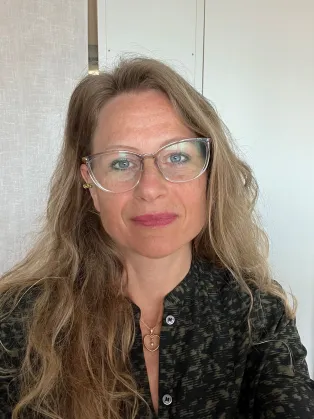– The research group I am going to visit is running a gigantic population study involving six major federal universities. It is reminiscent of the SNAC study, which I am using data from here in Sweden, but in multi-format, says Pernilla Alencar Siljehag, district nurse and SWEAH PhD student at the Department of Neurobiology, Health Sciences and Society at Karolinska Institutet.
The Ana Nery Nursing School at the Federal University of Rio de Janeiro has asked her to come for exchange talks with students and PhD students about the Swedish and Brazilian systems of elderly care and primary care.
– Meeting people is fantastic. You never know what it will lead to, who will take what with them for the rest of their lives from a certain moment. I have quite a long history with Brazil, I was a volunteer at a local environmental organization in Fortaleza almost 30 years ago. I am still involved in the community here in Sweden, which supports that activity. I also had a son and an (ex-)husband along the way and I did a short university exchange when I was doing my undergraduate nursing education. However, I have no experience of Rio.
She hopes to rent an apartment temporarily.
– You can't just look for the cheapest possible, you need to rely on tips and advice from those who live in the city, so that you can choose a residential area that is not very dangerous, in a building with a certain security structure. Many buildings are locked with walls around an apartment complex, sometimes with guards, camera surveillance and dogs - which drives up the cost.
The trip will be a way to bring a global health perspective into the doctoral project. The country is large and has rainforest as well as semi-desert, wetlands and megacities.
– The social and demographic challenges are great in Brazil, with hugely wealthy landowners, a highly intellectual elite, poverty, widespread obesity, slums, corruption, powerful drug cartels, indigenous peoples, tropical infectious diseases and a strong popular movement, she continues.
There is a lot of violence and vulnerability.
– And at the same time, a completely captivating sense of the collective and an everyday solidarity that clubs any Swede to the ground. The dynamics of the work culture are as far from the Swedish well-planned and well-organized one can get. Despite the low trust in authorities, large educational disparities and enormous, inaccessible rural areas, Brazil is world-renowned for its successful national vaccination campaigns. They also have a great state program for follow-up health work in the home with a focus on the whole family, says Pernilla Alencar Siljehag.
Classic public health work, prevention, "seeing the whole person" and a strong focus on vulnerable groups such as children and the older adults, something she, as a district nurse, is particularly interested in.
Brazil can be proud of its late educator and philosopher, Paulo Freire, who was important for the country's liberation from the military dictatorship in the 1960s. He still inspires grassroots activism today, which is of such great importance to indigenous peoples, feminists, small farmers, the gay movement and environmentalists.
Grassroots activism, which is of such great importance to indigenous peoples, feminists, small farmers, the gay movement and environmentalists."
– As a counterpoint to giant ranchers, mining companies and a strong macho conservative tradition, not least in rural areas, his legacy of ideas is the very foundation of action research (citizen/co-creation research), which has seen a major boost here in Sweden in recent years.
As an employee of the Elderly Center Foundation, Pernilla Alencar Siljehag closely follows the research program "Innovative Home Care and Partnership", IHoP, which is based on these ideas and which has been investigating and developing new solutions for Swedish home care for six years.
The midway review was passed last week, and her two-month adventure in Brazil awaits in October. It is mainly funded by a travel grant from SWEAH (SEK 25,000).
Learn more about Brazil's population study
Oswaldo Cruz Foundation representative Rosane Griep will come to Karolinska Institutet on May 13 to lecture on the ELSA-Brasil population study (open to all interested parties).
SWEAH travel grants 2025 Of the six applications received this year from SWEAH's PhD students the following are granted:
|



